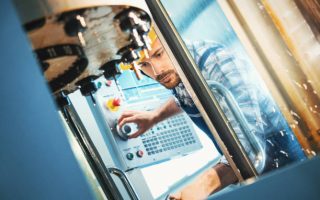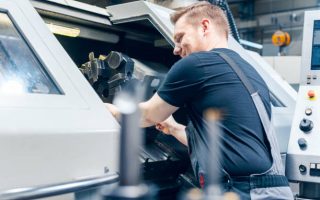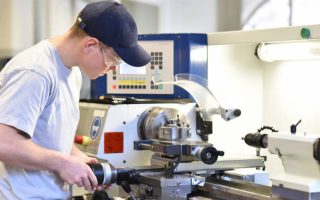
Introduction
The role of a CNC machine operator is critical in the modern manufacturing industry. With the rise of automation and precision engineering, CNC (Computer Numerical Control) machines have become indispensable tools in various industries. These machines are used to control machining tools such as drills, lathes, and mills through pre-programmed software. The CNC machine operator is responsible for setting up, maintaining, and operating these machines to ensure the production of high-quality parts. This research paper will delve into the responsibilities, skills, and qualifications required for a CNC machine operator, as well as the industry’s future trends and challenges.
CNC machine operators play a pivotal role in ensuring the smooth operation of CNC machines, which are used in industries such as aerospace, automotive, and electronics. The precision and efficiency provided by CNC machines are unmatched, making the role of the operator even more significant. As industries continue to evolve, the demand for skilled CNC machine operators is expected to grow. This paper will also explore the training and certifications required for individuals aspiring to become CNC machine operators, as well as the potential career growth opportunities in this field.
In the following sections, we will discuss the various aspects of the CNC machine operator’s role, including the types of CNC machines they work with, the skills required, and the challenges they face. Additionally, we will examine the impact of technological advancements on the role of the CNC machine operator and how these advancements are shaping the future of the industry. For those interested in pursuing a career as a CNC machine operator, this paper will provide valuable insights into the industry and the opportunities it offers.
The Role of a CNC Machine Operator
A CNC machine operator is responsible for the setup, operation, and maintenance of CNC machines. These machines are used to produce parts with high precision and accuracy, making the operator’s role crucial in ensuring the quality of the final product. The operator must be able to read and interpret blueprints, set up the machine according to the specifications, and monitor the machine’s performance throughout the production process.
In addition to operating the machine, the CNC machine operator is also responsible for performing routine maintenance and troubleshooting any issues that may arise during production. This requires a strong understanding of the machine’s components and how they work together to produce the desired outcome. The operator must also be able to make adjustments to the machine’s settings as needed to ensure that the final product meets the required specifications.
Types of CNC Machines
CNC machines come in various types, each designed for specific tasks. The most common types of CNC machines include CNC mills, CNC lathes, and CNC routers. CNC mills are used for cutting and shaping materials, while CNC lathes are used for turning and shaping cylindrical objects. CNC routers, on the other hand, are used for cutting and engraving materials such as wood, plastic, and metal.
Each type of CNC machine requires a different set of skills and knowledge to operate effectively. For example, CNC mill operators must be familiar with the machine’s cutting tools and how to adjust them for different materials, while CNC lathe operators must understand how to control the machine’s rotation speed and feed rate to achieve the desired results. CNC router operators, on the other hand, must be skilled in programming the machine to follow complex patterns and designs.
Skills Required for a CNC Machine Operator
To be successful as a CNC machine operator, individuals must possess a combination of technical skills and problem-solving abilities. Some of the key skills required for this role include:
- Proficiency in reading and interpreting blueprints and technical drawings
- Knowledge of CNC machine programming and operation
- Strong attention to detail and precision
- Ability to troubleshoot and resolve machine issues
- Understanding of machine maintenance and repair
- Good communication and teamwork skills
In addition to these technical skills, CNC machine operators must also have a strong understanding of safety protocols and procedures. Working with CNC machines can be dangerous, so operators must be vigilant in following safety guidelines to prevent accidents and injuries.
Training and Certification
Becoming a CNC machine operator typically requires a combination of formal education and on-the-job training. Many operators start by completing a vocational or technical program in CNC machining, where they learn the basics of machine operation, programming, and maintenance. These programs often include hands-on training with CNC machines, allowing students to gain practical experience before entering the workforce.
In addition to formal education, many CNC machine operators also pursue certification through organizations such as the National Institute for Metalworking Skills (NIMS). Certification programs typically require individuals to pass a series of exams that test their knowledge and skills in CNC machining. Obtaining certification can help operators stand out in the job market and demonstrate their expertise to potential employers.
Challenges Faced by CNC Machine Operators
While the role of a CNC machine operator can be rewarding, it also comes with its challenges. One of the biggest challenges is keeping up with the rapid advancements in CNC technology. As machines become more sophisticated, operators must continuously update their skills and knowledge to stay competitive in the industry. This often requires ongoing training and education, which can be time-consuming and costly.
Another challenge faced by CNC machine operators is the physical demands of the job. Operating CNC machines often requires standing for long periods, lifting heavy materials, and working in noisy environments. Additionally, operators must be able to work under pressure, as they are often responsible for meeting tight production deadlines.
The Future of CNC Machine Operators
The future of CNC machine operators looks promising, as the demand for skilled operators continues to grow. As industries such as aerospace, automotive, and electronics continue to expand, the need for precision machining will only increase. Additionally, advancements in CNC technology, such as the integration of artificial intelligence and machine learning, are expected to create new opportunities for operators.
However, these advancements also mean that CNC machine operators will need to stay up-to-date with the latest technologies and trends. This may require additional training and education, but it also presents an opportunity for operators to advance their careers and take on more specialized roles within the industry.
Conclusion
In conclusion, the role of a CNC machine operator is both challenging and rewarding. These operators play a crucial role in ensuring the precision and efficiency of CNC machines, which are essential in various industries. As technology continues to evolve, the demand for skilled CNC machine operators is expected to grow, creating new opportunities for those in the field. For individuals interested in pursuing a career as a CNC machine operator, the future looks bright, with numerous opportunities for career growth and advancement.
Whether you’re just starting your career or looking to advance in the field, becoming a CNC machine operator offers a rewarding and fulfilling career path. With the right training, skills, and certifications, you can become a valuable asset to any manufacturing team. If you’re interested in learning more about the role of a CNC machine operator, there are many resources available to help you get started.




